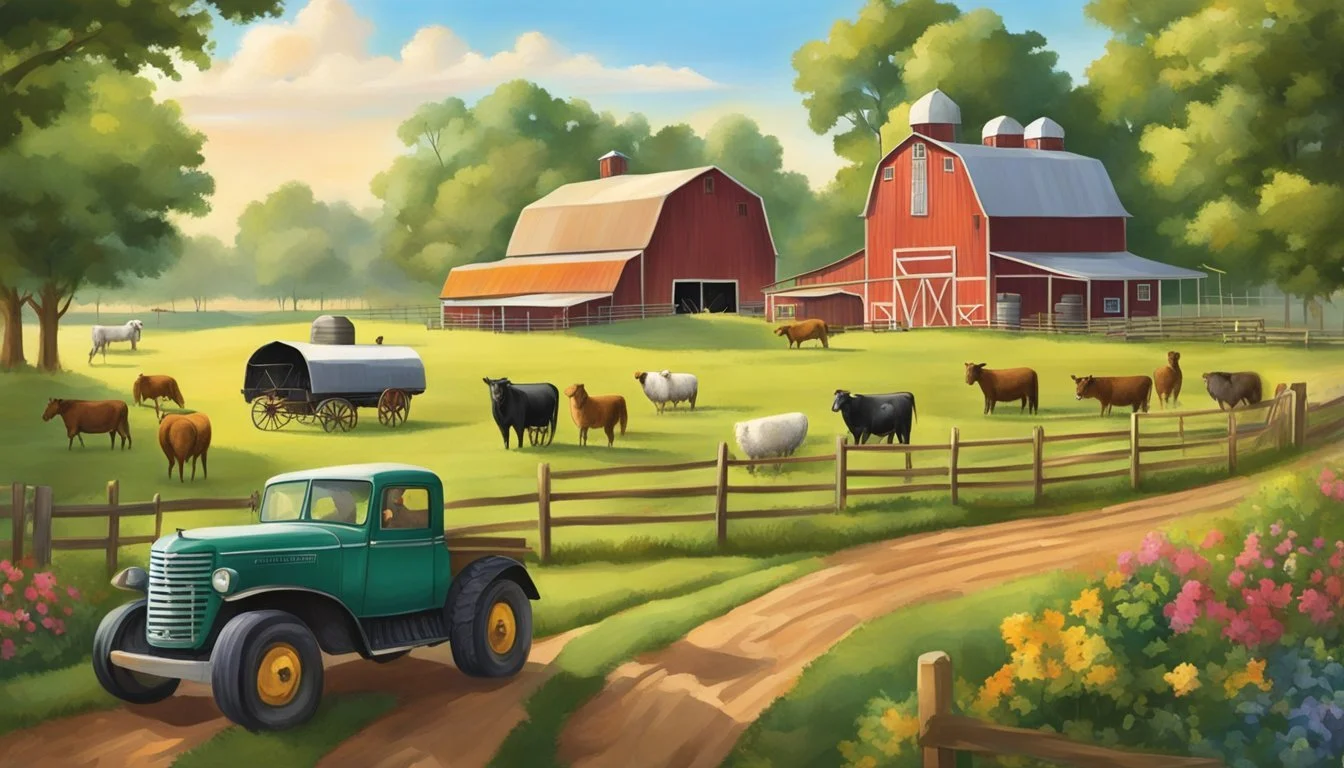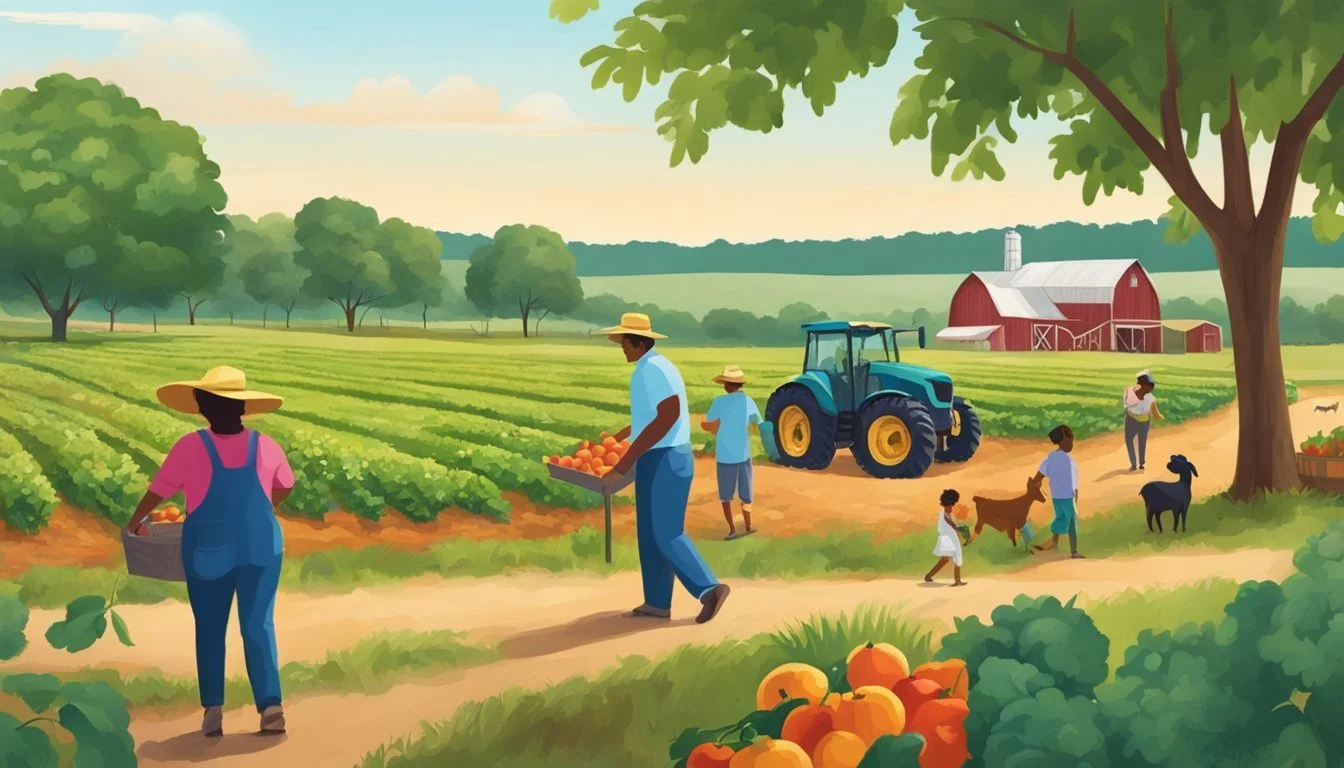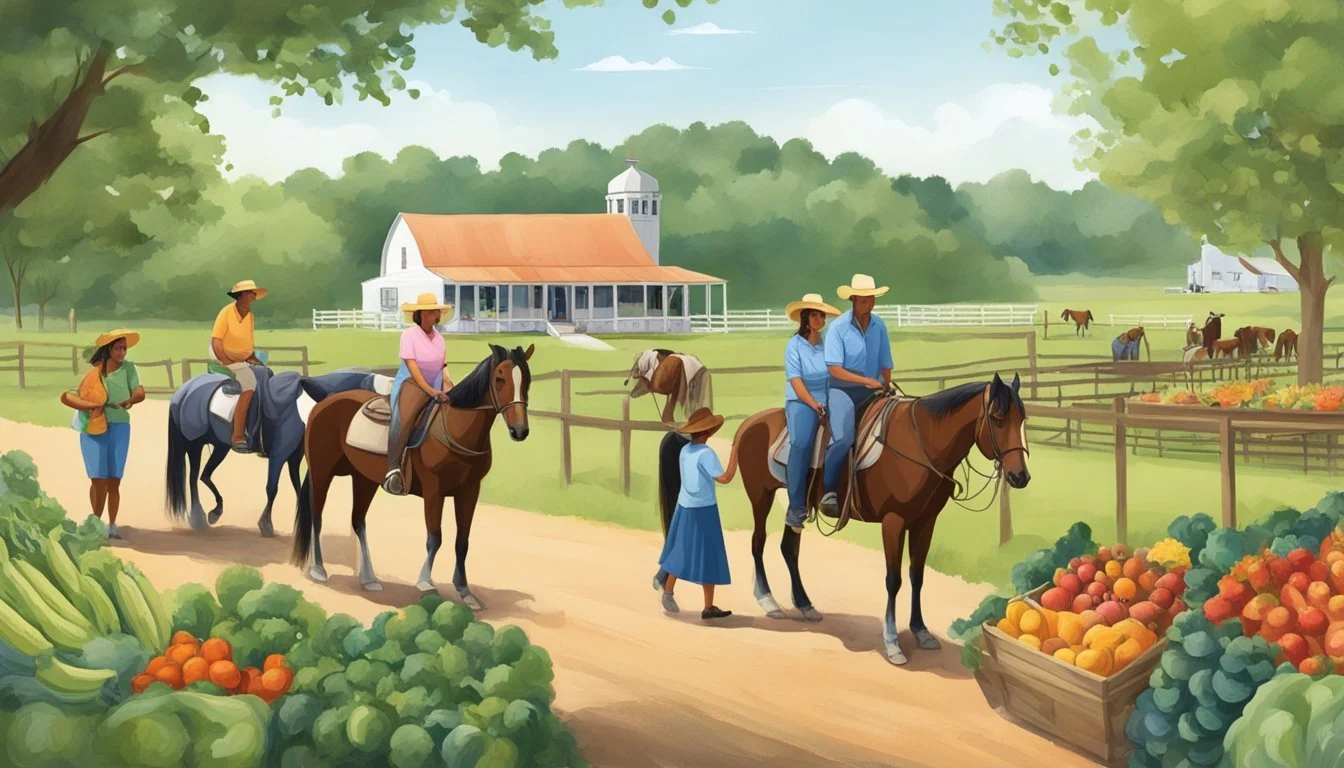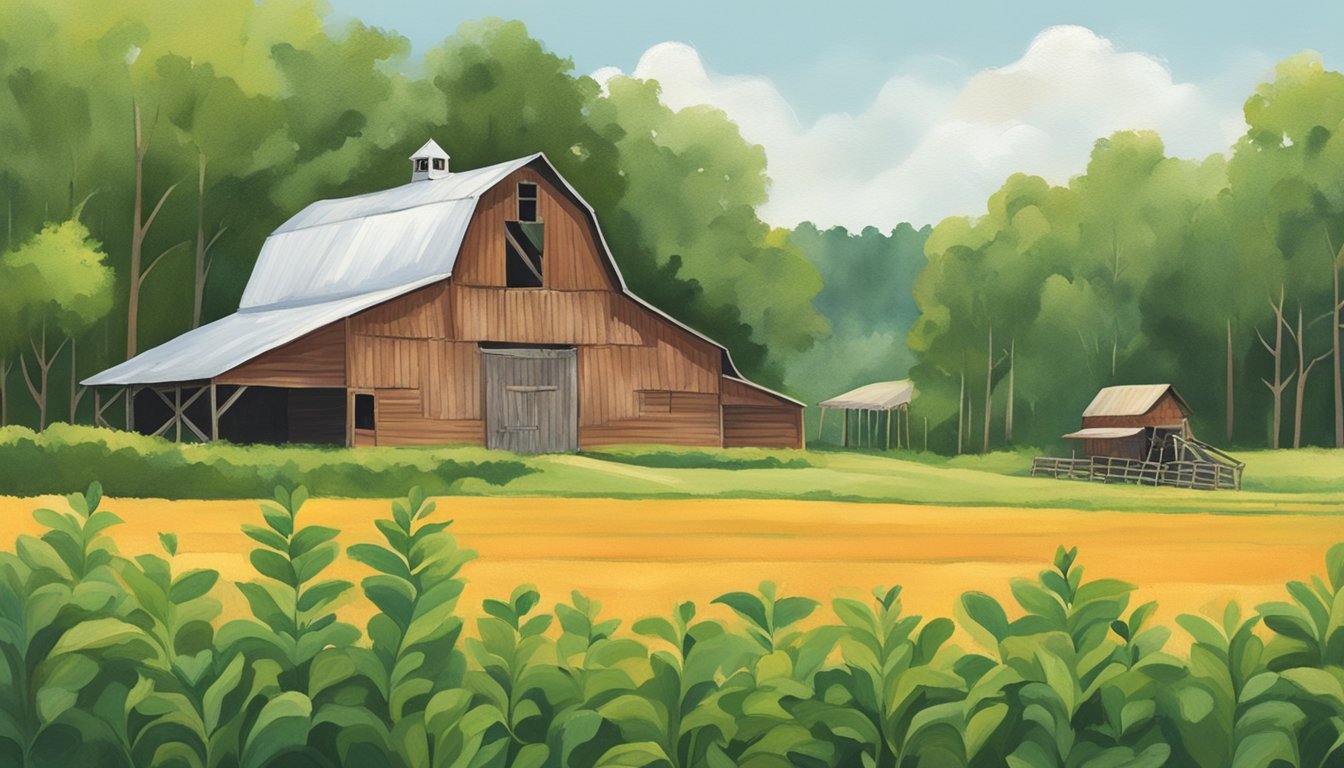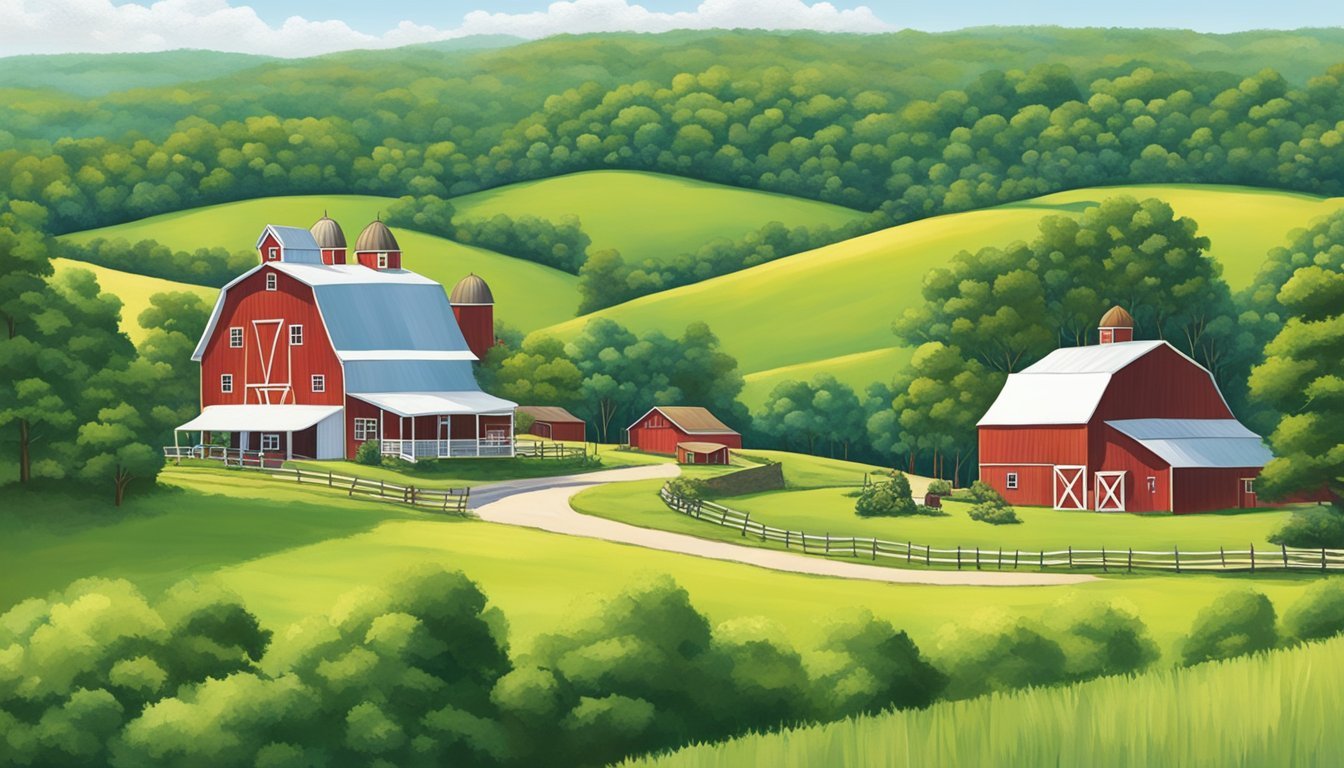Agritourism in Mississippi
Exploring the Magnolia State's Rustic Charms
Agritourism in Mississippi has emerged as a significant contributor to the state's economic vitality, particularly within its tourism sector. As a practice that involves visiting agricultural sites to experience and learn about farm life, it includes an array of activities that cater to tourists seeking a blend of education, recreation, and relaxation. Agritourism helps bridge the gap between rural and urban communities, opening a window to the cultivation processes and lifestyle that underpin the state's rich agricultural heritage.
Mississippi, often referred to as the Magnolia State, boasts a diverse range of agricultural operations that invite the public to enjoy authentic experiences – from picking fruits at orchards and exploring pumpkin patches, to navigating corn mazes and participating in harvest festivals. This surge in visitor interest not only supports local agriculture but also preserves the cultural landscape and traditions, lending an economic hand to farmer's and landowner's finances through direct product sales and diversification.
Recognizing the potential of agritourism, various associations and entities in Mississippi have dedicated themselves to advancing the growth of this industry. Key efforts are focused on increasing the visibility of agritourism destinations and ensuring a quality experience for visitors. This organized approach has been integral in cultivating a sustainable agritourism model, making Mississippi a notable destination for those interested in the intersection of agriculture and tourism.
Understanding Agritourism
Agritourism blends agricultural and tourism sectors to foster economic development, often leading to the growth of the rural economy through diversified farm revenue streams and educational experiences.
Defining Agritourism
Agritourism is the intersection of agriculture and tourism where the general public visits operational farms, ranches or other agricultural enterprises. It’s a way for consumers to engage directly with agricultural processes and landscapes.
The Role of Agritourism in the Mississippi Economy
In Mississippi, agritourism is a burgeoning facet of the state's economy, generating significant revenue. With approximately $150 million infused annually, the agritourism industry is recognized as one of the fastest growing tourism markets.
Economic Contributions:
Diversifies farmers' income streams
Boosts demand and visibility for local products
Promotes direct sales and value-added production
Benefits of Agritourism to Local Communities
Agritourism offers numerous advantages to local communities beyond the economic impact.
Educational Opportunities: Schools and families often visit farms to learn about agriculture and the sourcing of food.
Community Growth:
Supports local employment
Strengthens community bonds through shared experiences
Encourages the preservation of agricultural heritage and traditions
Planning Your Agritourism Visit
When planning a visit to Mississippi's agritourism attractions, it's essential to consider the variety of experiences available and the seasonal activities that can enhance your trip.
Types of Agritourism Attractions in Mississippi
Mississippi offers a diverse range of agritourism destinations that cater to different interests. Visitors can explore u-pick farms, where they can harvest their own fruits and vegetables, which is especially popular for items like strawberries and apples. Many farms also feature hayrides and petting zoos, providing a fun and interactive experience for families. For those interested in local produce and crafts, farmers markets are ideal venues to visit.
Attraction Description U-Pick Farms Guests select and pick fresh produce directly from the plant. Petting Zoos Interactive experience with farm animals. Farmers Markets Markets featuring locally grown produce and artisanal products.
Visitors should also not miss out on specialized venues such as corn mazes and pumpkin patches in the fall, which are perfect for family-friendly outings.
Seasonal Events and Activities
Seasonal events play a significant role in agritourism in Mississippi. During the autumn months, farms often host events centered around corn mazes and pumpkin patches, complete with hayrides through the crisp fall air. The holiday season sees farms transform into winter wonderlands, offering Christmas trees for sale and unique holiday-themed activities.
Here's a seasonal guide to help plan your visit:
Season Activity Description Fall Corn Mazes and Pumpkin Patches Navigate through mazes and pick your own pumpkin. Winter Christmas Tree Farms Choose and cut your own tree for the holidays.
For those looking for unique lodging experiences, many farms provide accommodations that allow guests to fully immerse themselves in the rural lifestyle. Always check with agritourism venues ahead of time for available lodging options and plan accordingly.
Mississippi's natural landscape also offers chances for fishing and bird watching, which can be a tranquil complement to the excitement of farm activities. Regardless of the time of year, visitors can find an agritourism experience that suits their interests and provides a memorable and educational experience.
Engaging Educational Experiences
Mississippi's agritourism offers a rich tapestry of engaging educational experiences that connect visitors with the state's agricultural heritage. These experiences provide valuable insights into the life and work of farmers and the importance of agriculture to the state's economy.
Agricultural Education on the Farm
Visitors to Mississippi's farms have the unique opportunity to gain hands-on agricultural education. Educational tours are commonplace, often guided by the knowledgeable farmers themselves. For instance, at a typical farm, one might learn about crop cycles, livestock care, and sustainable farming practices. Such tours not only educate but also immerse visitors in the day-to-day operations of a working farm.
Field Trips and Educational Programs
Mississippi State University (MSU) Extension and various agritourism sites collaborate to offer field trips and educational programs tailored to different age groups. Schoolchildren and church groups, in particular, benefit from these programs, as they can directly interact with farm animals and witness agriculture in action. These structured visits may include activities such as:
Picking fruits or vegetables in season
Participating in a farm-to-table experience
Engaging with farm animals, like alpacas at places like Arella Farm, LLC
Educational programs provide a valuable link between theoretical textbook knowledge and real-world applications, making learning tangible and memorable.
Economic Aspects of Agritourism
Agritourism presents significant opportunities for revenue generation for landowners and contributes to the broader regional economy through travel and tourism. This section examines the financial benefits for farmers and the industry's economic impact on Mississippi.
Financial Implications for Landowners and Farmers
Farmers and landowners leverage agritourism operations as a means to diversify income streams. By opening their working farms to the public for educational and recreational experiences, they generate additional revenue beyond traditional agricultural sales. Revenue varies widely, depending on the size and type of the agritourism operation, but each successfully marketed event or season can significantly supplement a farm's income profile.
Agritourism's Impact on Mississippi's Economy
Agritourism intertwines with the travel and tourism industry as a growing component of Mississippi's economic development. It draws an estimated 20.8 million visitors annually, infusing the local economy with sales from not just agritourism activities, but also associated travel expenditures. This synergy promotes the development of rural areas, helping to sustain the agricultural heritage while providing lifeblood to local economies.
Economic Impact: Agritourism activities, along with related outdoor recreation like hunting and wildlife watching, have a near $2.7 billion impact annually.
Income for Communities: Local businesses benefit from the influx of tourists, with increased sales in sectors like lodging, food service, and retail.
Development: This sector's link with agriculture helps to foster sustainable development strategies in rural areas.
In Mississippi, farmers and the state economy both profit from the dynamic relationship between agriculture and tourism, indicating a positive trend towards the integration of agritourism within regional economic plans.
Agritourism Activities
Mississippi's agritourism blends entertainment with education, offering visitors the chance to engage in a variety of farm-related activities while learning about agricultural practices and lifestyle.
On-Farm Activities
Visitors to agritourism farms in Mississippi can indulge in hands-on experiences like feeding and interacting with animals. These activities often include wagon rides that tour the farm, allowing guests to view crop fields and livestock areas. Farms may also organize train rides for a unique perspective of the landscape.
Animals: Petting zoos, dairy cow milking
Wagon Rides: Guided tours, story-telling journeys
Festivals and Seasonal Offerings
Seasonal events are a vital part of the agritourism experience, with festivals and pumpkin patches being particularly popular in the fall. These festivals typically provide themed activities such as hay bale mazes for children and adults alike, adding an element of adventure to the farm visit.
Pumpkin Patches: Pick-your-own pumpkins, photo opportunities
Hay Bale Maze: Navigational challenges, family fun
Outdoor Adventures and Wildlife
For those seeking a more adventurous visit, some farms offer fishing in stocked ponds or bird watching opportunities, where Mississippi's diverse avian life can be observed. Farms with larger expanses of land might also provide camping sites for an immersive outdoor experience.
Fishing: Catch and release, bait and tackle tips
Bird Watching: Guided tours, identification workshops
Camping: Overnight stays, campfire storytelling
Strategic Development of Agritourism
The strategic development of agritourism in Mississippi centers on enhancing visibility and generating sustainable income through effective marketing and fostered partnerships.
Marketing and Promotion Strategies
Mississippi's agritourism venues capitalize on strategic marketing plans that encompass a multitude of advertising channels. Social media plays a pivotal role in this approach, engaging audiences with on-farm experiences through platforms like Facebook and Instagram. Traditional methods, such as brochures and local media, complement online outreach. Moreover, they employ direct sales to attract consumers by offering unique educational and hospitality experiences.
Advertising Mix:
Online: Social media campaigns, SEO, and website listings.
Traditional: Print ads, brochures, and billboards.
Key Marketing Objectives:
Increase visitor traffic.
Enhance online and offline visibility.
Promote the agritourism experience focusing on education and hospitality.
Partnerships for Agritourism Expansion
Partnerships serve as a cornerstone for the advancement of Mississippi's agritourism. Engaging in collaborations with local businesses and the Mississippi Department of Agriculture and Commerce stimulates community growth and drives the collective promotion of agritourism ventures. These relationships lead to mutually beneficial opportunities, which include cross-promotion and sharing of resources to offer a more comprehensive experience.
Potential Partners:
Local businesses
Educational institutions
Tourism boards
Hospitality providers
Partnership Goals:
Leverage local expertise and resources.
Expand lodging and activity options.
Strengthen Mississippi's position as a prominent agritourism destination.
Legal and Safety Considerations
When engaging in agritourism in Mississippi, operators must understand the intricate legal requirements and liability protections afforded by the law and ensure the implementation of robust safety and risk management practices.
Understanding Liability and Legal Requirements
Mississippi agritourism businesses are granted liability protection under the Mississippi Agritourism Limited Liability Law. This law stipulates that agritourism professionals are not liable for injuries or deaths that result from the inherent risks of agritourism activities, provided these risks are recognized and openly communicated to participants.
Key Points:
Limited Liability Law: Found in Mississippi Code Title 69, Chapter 53, insulates landowners from certain liabilities.
Warning Signs: Businesses must post clearly visible signs warning visitors of the potential risks, in line to comply with the state's requirements.
Insurance: Operators are encouraged to carry insurance to cover scenarios that fall outside the scope of the Limited Liability Law.
Promoting Safety and Managing Risks
Ensuring the safety of visitors is paramount. Agritourism operators should implement thorough risk management plans to address recognized hazards and mitigate potential risks.
Implementation Strategies:
Risk Assessment: Regularly evaluate activities to identify and minimize hazards.
Training: Properly train staff in safety protocols and emergency response.
Regulations: Adhere to state-required safety measures, including controlling visitor capacities and facilitating social distancing measures where necessary.
By adhering to these legal and safety guidelines, Mississippi agritourism entities can foster a secure environment that enhances visitor experience while protecting the business itself.
Support and Resources for Agritourism Operators
In Mississippi, agritourism operators have access to a robust network of support and resources dedicated to enhancing agritourism ventures. These include associations that provide networking opportunities and governmental bodies offering specific aid.
Agritourism Associations and Networks
The Mississippi Agritourism Association (MAA) serves as a pivotal resource for agritourism operators. Membership with the MAA facilitates:
Access to experienced MSU Extension personnel
Collaborative networking through member meetings
Sharing best practices and learning from established agritourism operators
The association's efforts aim to promote the growth and quality development of the agritourism industry within the state, offering support and guidance to new and existing ventures.
Governmental Aid and Resources
The Mississippi Department of Agriculture and Commerce (MDAC) provides critical resources that assist agritourism operators in various aspects of their business, including:
Economic development initiatives
Marketing and promotional support
Educational resources to enhance visitor experiences
Clarification and dissemination of relevant regulations, such as the Mississippi Agritourism Limited Liability Law which offers protection to operators
By leveraging the support offered by the MDAC, agritourism businesses can enhance their contributions to local economies and tourism sectors, while ensuring alignment with state efforts and compliance with legal frameworks.
The Future of Agritourism in Mississippi
Mississippi's agritourism industry, blending agriculture and tourism, is evolving with new trends and technological advances, promoting sustainability and ensuring continued growth.
Trends and Innovations in Agritourism
Mississippi's agritourism has recently been integrating innovative technologies and adopting new trends to enhance the visitor experience. The rise of digital platforms offers tourists the convenience to locate and visit local farms. Online tools, created by organizations like the Mississippi Agritourism Association, enable quick access to farm locations and information.
Smart agriculture practices are becoming commonplace. Farms are using precision farming techniques to showcase modern agriculture to visitors. These technologies not only improve the efficiency of production but also serve as educational tools for the public on how technology can be harnessed in agriculture.
Sustaining Agritourism Growth
For the sustainability of its agritourism industry, Mississippi focuses on both economic stability and environmental practices. The future of the industry depends on its ability to adapt to changing consumer demands and market trends. By diversifying farm activities, operators can create additional revenue streams while educating the public on sustainable farming practices.
Supporting local farms through government initiatives and partnerships remains crucial for the growth of agritourism. This includes providing resources for farmers to expand into agritourism and ensuring that regulations are supportive of agritourism development. Regular collaboration with health and safety authorities ensures that agritourism venues continue to provide safe, enriching experiences that align with current guidelines and reflect the industry's commitment to growth and innovation.
Cultural and Historical Significance
Mississippi's agritourism offers a unique window into the state's rich agricultural heritage and highlights its significant role in shaping cultural narratives through storytelling.
Mississippi's Agricultural Heritage
The foundation of Mississippi's economy has long been seeded in its fertile soil, making agriculture a mainstay in both its heritage and history. This close-knit relationship with the land is central to understanding Mississippi's identity. The state's farms are not just food producers; they are living museums, safeguarding traditions and practices handed down through generations. This linkage is especially evident in the numerous family-owned farms, where traditional farming methods continue to be honored and preserved.
Agritourism and Cultural Storytelling
Agritourism in Mississippi intertwines agricultural practices with cultural storytelling, offering visitors an immersive experience into the state's past and present. Each agritourism site serves as a narrator, recounting stories of Mississippi's evolution from a predominantly agrarian society to a diversified economy. Here, one finds an ongoing dialogue between the roots of Mississippi farm life and the cultural tapestry they support, providing a tangible connection to the region's history and heritage through interactive experiences.
Agricultural practices: Demonstrations and participatory activities
Cultural storytelling: Oral histories, guided tours, and educational programs
By engaging directly with the land and its stewards, visitors gain a firsthand understanding of the cultural significance embedded in Mississippi's agritourism ventures.
Visiting Mississippi Farms
Farm tourism in Mississippi presents diverse activities to engage in, from meandering through farmers markets that feature local corn and produce, to unique experiences like hayrides and alpaca encounters.
Farmers Markets and Direct Sales
Visitors looking to experience the freshest produce Mississippi has to offer can explore an array of farmers markets across the state. There, they can enjoy direct sales of products such as corn, seasonal fruits, and regional specialties. It's common to find:
Corn: A staple at many markets, often sold both on the cob and as part of value-added products.
Fish: Local catch from Mississippi's waterways, highlighting the state's aquaculture.
Families can relish in the farm-to-table experience, meeting the very farmers who cultivate their food.
Unique Farm Experiences
For those seeking more interactive farm visits in Mississippi, there's no shortage of special experiences:
Hayrides/Wagon Rides: Traditional rides that tour the scenic farm landscapes.
Corn Mazes: Ingeniously designed mazes that provide fun and challenge for all ages.
Pumpkin Patch: Seasonal attractions where visitors can pick their own pumpkins.
Petting Zoos: Encounters with farm animals that offer education and excitement, particularly for children.
Alpaca Farms: Some farms specialize in raising these unique animals, with many offering educational tours and activities.
Whether one is navigating a corn maze, reveling in the joy of a hayride, or discovering the charm of a pumpkin patch, Mississippi farms combine agriculture with entertainment, creating lasting memories for all who visit.
Supporting the Agritourism Community
The vitality of agritourism in Mississippi hinges upon robust visitor engagement and community support, central to sustaining local farms and ranches.
How Visitors Can Support Local Agritourism
Visitors have numerous opportunities to support the agritourism community in Mississippi.
Engaging with Local Produce: Purchasing directly from farms not only provides consumers with fresh goods but also injects capital straight into the local agricultural economy.
Participating in Educational Tours: Consumer education is a vital part of agritourism. By partaking in farm and ranch tours, attendees learn about where their food comes from, which fosters appreciation and supports community endeavors.
Staying at Farm Lodgings: When visitors choose to stay on a farm or ranch, they experience rural life firsthand. This patronage is a direct form of support, contributing to diversified income for these agricultural enterprises.
Buying Souvenirs: Merchandise and handicrafts available for purchase are often made by local artisans. Sales of these items celebrate and support the regional culture and craftsmanship.
Through these interactions, visitors become vital contributors to the sustainability and growth of Mississippi's agritourism sector.
Conclusion
Agritourism in Mississippi provides a robust opportunity for tourists to engage in agricultural experiences. Visitors can immerse themselves in activities such as picking fruits like strawberries, blueberries, and sweet potatoes. They have the chance to see firsthand the importance of animals in agriculture, highlighted by the presence of farms such as Arella Farm, LLC, where interacting with alpacas is a key attraction.
Economic Impact: Agritourism has shown to be a growing sector, with a reported 30 percent increase compared to other tourism sectors. It contributes to local economies by attracting tourists to rural areas, thereby providing income and employment opportunities for communities.
Educational Value: The hands-on experience educates the public on farming practices and the origins of their food. It demonstrates the commitment to sustainable agriculture and the preservation of rural livelihoods.
Cultural Significance: Agritourism helps preserve Mississippi's rich agricultural heritage. It allows visitors to relive traditional experiences like hunting, connecting them with the state's history and traditions.
In summary, agritourism in Mississippi offers educational, economic, and cultural benefits. It stands as a growing tourism niche that encourages appreciation of agricultural life and contributes to the state's economic vitality.
Note: Data and statistics are current as of the knowledge cutoff date.


